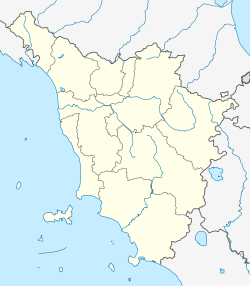Lucca | |
|---|---|
| Comune di Lucca | |
 View of Lucca (2022) | |
| Coordinates: 43°50′30″N 10°30′10″E / 43.84167°N 10.50278°E | |
| Country | Italy |
| Region | Tuscany |
| Province | Lucca (LU) |
| Frazioni | see list |
| Government | |
| • Mayor | Mario Pardini (Independent) |
| Area | |
• Total | 185.5 km2 (71.6 sq mi) |
| Elevation | 19 m (62 ft) |
| Population (30 September 2017)[2] | |
• Total | 89,346 |
| • Density | 480/km2 (1,200/sq mi) |
| Demonym | Lucchesi |
| Time zone | UTC+1 (CET) |
| • Summer (DST) | UTC+2 (CEST) |
| Postal code | 55100 |
| Dialing code | 0583 |
| ISTAT code | 046017 |
| Patron saint | St. Paulinus |
| Saint day | July 12 |
| Website | comune.lucca.it |

Lucca (/ˈluːkə/ LOO-kə; Italian: [ˈlukka] ) is a city and comune in Tuscany, Central Italy, on the Serchio River, in a fertile plain near the Ligurian Sea. The city has a population of about 89,000,[3] while its province has a population of 383,957.[4]
Lucca is known as an Italian "Città d'arte" (City of Art) from its intact Renaissance-era city walls[5][6] and its very well preserved historic center, where, among other buildings and monuments, are located the Piazza dell'Anfiteatro, which has its origins in the second half of the 1st century A.D., the Guinigi Tower, a 45-metre-tall (150 ft) tower that dates from the 14th century [7][8] and the Cathedral of San Martino.[9]
The city is the birthplace of numerous world-class composers, including Giacomo Puccini, Alfredo Catalani, and Luigi Boccherini.[10]
- ^ "Superficie di Comuni Province e Regioni italiane al 9 ottobre 2011". Italian National Institute of Statistics. Retrieved 16 March 2019.
- ^ Population data from Istat
- ^ "Popolazione Lucca (2001-2020) Grafici su dati ISTAT". Tuttitalia.it (in Italian). Retrieved 7 January 2022.
- ^ "Provincia di Lucca (LU)". Tuttitalia.it (in Italian). Retrieved 7 January 2022.
- ^ Magrini, Graziano. "The Walls of Lucca". Scientific Itineraries of Tuscany. Museo Galileo. Retrieved 25 March 2013.
- ^ "Roman amphitheatre in Lucca | Visit Tuscany". www.visittuscany.com. Retrieved 7 January 2022.
- ^ "20 Bellissime Città d'Arte in Italia". Skyscanner Italia (in Italian). 16 April 2016. Retrieved 7 January 2022.
- ^ "Cathedral of San Martino in Lucca".
- ^ Joe. "9 Facts About Lucca |". Retrieved 7 January 2022.[permanent dead link]




